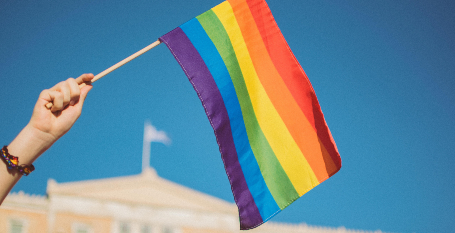A woman carrying a Pride flag was reportedly shot in the head with a BB gun after taking part in a Polish LGBTQ+ equality march.
Listen to this article
0:08 / 3:53
The third Olsztyn Equality March, which took place on 20 May, is a celebration of Poland’s queer community at a time when LGBTQ+ rights are increasingly under attack, not least due to the country’s controversial enforcement of ‘LGBT-free zones’.
One of the event’s organisers, Olsztyński Marsz Równości, reported that a woman who had participated in the march was shot with in the head with a BB gun while walking to an afterparty and carrying a rolled up Pride flag.
The victim suffered minor head injuries and was checked over in hospital before being released. The case has been reported to police but the perpetrator has not yet been found.
A statement signed by the Olsztyn Equality March organisers, reported by local news site Wyborcza.pl, reads: “This is an attack on all of us! Even if the police refuse to see a link between the shooting and the Equality March, we explicitly condemn this attack as an act of violence directed against the entire LGBTQIA+ community and its allies.
“This is what we face all over Poland, including Olsztyn. This is our home and we have the right to feel safe here. You will not intimidate us!”
It isn’t the first time participants of equality marches have been attacked in Poland.
In 2019, journalists were injured by a right-wing group in Lubin, who reportedly threw a soda can at the head of one, and punched the other in the face.
In the same year, the very first Pride parade in Białystok saw participants spat on, beaten, tugged and assaulted with objects such as flares, glass bottles and stones. A teenager was beaten brutally and several young women assaulted, according to Wyborcza.pl.
In 2021, a participant at the Łódź Equality March was dragged across the ground and had his head was hit against a wall, after anti-LGBTQ+ nationalists “hunted” down people who had walked in the Equality March.
LGBTQ+ rights are under attack in Poland
The attack following Olsztyn’s third Equality March comes mere days after the European Commission has confirmed that anti-LGBTQ+ zones in Poland can “kiss their EU funding goodbye” if they continue to enforce discriminatory policies.
In 2019, more than 100 municipalities in Poland declared themselves ‘LGBT-free zones’, with anti-LGBTQ+ sentiment gaining significant ground in the central European country in recent years.
ILGA-Europe has rated Poland as the worst EU nation for LGBTQ+ rights. Poland comes in last place out of 27 countries, ranked based on how their laws and policies impact on the lives of LGBTQ+ people.
The rise in anti-LGBTQ+ rhetoric is partly due to PiS (Law and Justice) party leader, Jaroslaw Kaczyńsk, who secured an election victory on the back of a campaign that was criticised for its anti-LGBTQ+ rhetoric.
Municipalities started passing the first resolutions against so-called “LGBT propaganda” in March 2019, just as PiS ramped up its anti-LGBT messaging.
In response, the EU declared itself an “LGBT+ freedom zone”.
Earlier this month, Poland’s commissioner for children’s rights protection, Mikołaj Pawlak, demanded inspections of the country’s LGBTQ-friendly schools to root out so-called “criminals and paedophiles”.
A woman carrying a rainbow flag was reportedly shot in the head with a BB gun after taking part in the Olsztyn Equality March in Poland.
The march took place on 20 May. It's the third time that the event has been held - the event is described as a celebration of Poland's queer community.
The victim was attacked with a BB gun while walking to an afterparty and carrying a rolled up rainbow flag. She suffered minor head injuries and was released from hospital after treatment. To date, no one has been charged in relation to the attack.
What's life like for LGBTQ people in Poland?
Poland remains a very socially-conservative country, with the Catholic Church a big player in shaping public opinion.
Religious conservatism is a powerful force in maintaining support for the ruling Law and Justice party.
Poland’s 1997 constitution states that a marriage is between a man and a woman.
Civil partnerships between same-sex couples are not legally recognised.
LGBTQ Pride parades in Poland are routinely attacked by far-right activists.
Despite international outrage – and threats from the EU of withdrawal of funding – around 100 municipalities have declared themselves “LGBTQ-free zones”. This equates to about one-third of Poland – an area about the size of Hungary.












 打印版本
打印版本

















读者回应
抢先发表第一个回应吧!
请先登入再使用此功能。